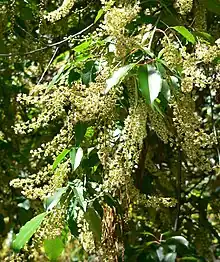| Prunus brachybotrya | |
|---|---|
 | |
| Scientific classification | |
| Kingdom: | Plantae |
| Clade: | Tracheophytes |
| Clade: | Angiosperms |
| Clade: | Eudicots |
| Clade: | Rosids |
| Order: | Rosales |
| Family: | Rosaceae |
| Genus: | Prunus |
| Species: | P. brachybotrya |
| Binomial name | |
| Prunus brachybotrya Zucc. | |
| Synonyms | |
| |
Prunus brachybotrya is a species of tree in the family Rosaceae. It is native to Mexico. Individuals have been found growing in Central American countries. The resplendent quetzal has been observed feeding on this tree.[1]
Distribution and habitat
P. brachybotrya is found in southeastern Mexico, particularly in Chiapas, and grows in cloud forests between 1200–2400 m of elevation.[2][3]
Uses
The wood of P. brachybotrya is reddish brown in color and is suitable for woodturning.[4] Among the Tarahumara its leaves, which smell strongly of hydrogen cyanide, are used to kill fish when harvesting a pond, eaten to deter insects from biting, and used in infusions to relieve coughs and other ailments.[5]
References
- ↑ Solórzano, Sofía; Castillo, Silvia; Valverde, Teresa; Ívila, Lourdes (September 2000). "Quetzal Abundance in Relation to Fruit Availability in a Cloud Forest in Southeastern Mexico" (PDF). Biotropica. 32 (3): 523–532. doi:10.1111/j.1744-7429.2000.tb00498.x. Retrieved 4 December 2018.
- ↑ The red list of Mexican cloud forest trees. González-Espinosa, Mario. Cambridge: Fauna & Flora International. 2011. p. 74. ISBN 9781903703281. OCLC 816551109.
{{cite book}}: CS1 maint: others (link) - ↑ "SEINet Portal Network - Prunus brachybotrya".
- ↑ Catálogo técnico de los nombres comunes de las especies forestales maderables (in Spanish). INEGI. 2001. p. 91.
- ↑ Irigoyen-Rascón, Fructuoso; Paredes, Alfonso (2015). Tarahumara Medicine: Ethnobotany and Healing among the Rarámuri of Mexico. Norman : University of Oklahoma Press. p. 255. ISBN 9780806152714.
External links
This article is issued from Wikipedia. The text is licensed under Creative Commons - Attribution - Sharealike. Additional terms may apply for the media files.